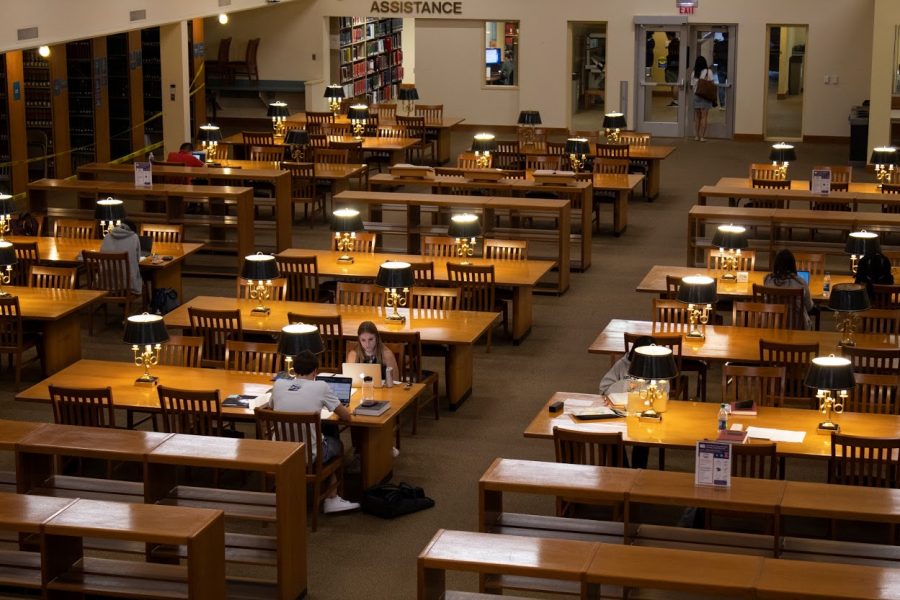Library transforms print collection to online
Students study in the College of Law Library on Sept. 20, 2019. Many libraries on campus have limited their in-person services since the beginning of the COVID-19 pandemic.
January 21, 2021
University libraries have been closed for a majority of in-person services since the end of the Spring 2020 semester when COVID-19 hit campus. There are no plans to change that for the upcoming semester, but several adjustments have been made to make library materials and services more accessible online.
“We basically spent most of last summer planning out our services,” said Chris Prom, associate dean and associate librarian for digital strategies.
A core element of the library’s response to COVID-19 has been increasing digital access to materials that were already its print collection.
“A significant majority of the library’s spending is already on electronic resources, so we were by and large fairly well-positioned to serve many of those needs,” said Tom Teper, associate dean and associate librarian for collections and technical services.
Some materials were not previously available digitally but had been scanned for preservation purposes so they could be made available, while others were already available electronically because they were out of copyright.
Get The Daily Illini in your inbox!
Materials out of copyright are available both in print and online through HathiTrust, a library cooperative where members contribute their own collections. Additionally, the HathiTrust Emergency Temporary Access Service provides access to materials already in a library’s print collection that are in copyright and would not normally be allowed to freely circulate online as long as the library does not circulate the physical copies.
The University was one of the founding members of HathiTrust and contributed hundreds of thousands of items to be digitized and included, according to Teper. Items in HathiTrust that overlap with the University’s collection can be made available digitally, which allows faculty and students not currently located in Urbana-Champaign to access those materials, especially those that would not normally be available digitally.
“That’s been great because it’s allowed a level of access that just simply wouldn’t be possible normally,” Prom said.
Sara Holder, director for reference and research services, said the library has seen an exponential increase in the volume of messages through the Ask a Librarian online chat and email service.
“Particularly, last spring when the whole university dispersed off of campus, we heard from many people who chatted in and wrote to us the words ‘you’re the only one who’s there,’” Holder said.
A number of people who support the chat service are graduate students in the School of Information Sciences, and Holder said one challenge was training and mentoring a new group of assistants remotely.
Subject specialists have also seen a positive response to online reference services from students, faculty and other researchers around the world who currently cannot visit the University. Additionally, librarians who do research consultations partner with the Writers Workshop in the Undergraduate Library to help students who are writing research papers.
Matt Roberts, literature and languages librarian, often works with students doing graduate level research, helping them find scholarship and primary source materials related to their research. He says people who work in the humanities tend to prefer working with print materials.
“In the humanities, especially at the graduate level, when you’re taking your field exams, you’re reading an awful lot of material, in some cases 100 or 200 books,” Roberts said.
People may have physical issues reading all of that material on a computer screen, and some ebook platforms make it difficult for users to make notes and annotations.
Initially, the library had an online-preferred delivery system, but it has become more flexible in offering print options. Patrons can pick up materials from lockers at Marshall Gallery.
To check out materials, users can submit a request form and indicate if they prefer print access. Users who need a large volume of materials should connect directly with a librarian who can then possibly connect them with a subject specialist who best knows how to navigate a particular collection.
Library services will largely remain the same this semester, and any updates will be posted to the library website’s COVID-19 page.
“If a student is having problems getting access to a resource or just doesn’t feel as if their needs are being met in some way we’re very open to hearing from them because the only way we can improve things is if we know directly what concerns people are having,” Prom said.







